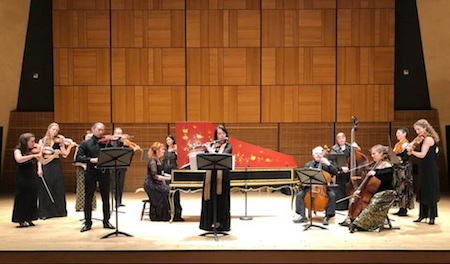by Jarrett Hoffman

Apollo’s Fire brought the house down and the heart rates up at their Carnegie Hall debut last Thursday, March 22 at the venue’s cozy Zankel Hall in New York City. The highlight of this “Evening at Bach’s Coffeehouse” was the closer: a thrilling, caffeinating performance of Vivaldi’s “La Follia” Sonata for Two Violins and Continuo, arranged by artistic director, conductor, and harpsichordist Jeannette Sorrell for this Cleveland-based Baroque orchestra.
One of the first draws in the work is the combination of two very different percussive sounds — harpsichord and guitar, beautifully played by Sorrell and John Lenti. Soon the two soloists take charge. Violinists Olivier Brault and Julie Andrijeski played with charisma and chemistry: energy seemed to zoom between them like electrons. Lenti’s rapping on the wood of the guitar added to the rollicking spirit, and Brault led the mad dash to the end — one of those moments a listener remembers years later, thinking ‘now that’s music.’
A neat parallel came on the other end of the program in six selections from Telemann’s Suite “Burlesque de Quixotte.” The final movement, ironically titled “Don Quixote Asleep,” ends with its own rush of volume and speed. Earlier in the work, the ensemble captured Telemann’s little shifts of mood and twists of fate, one section’s closure turning suddenly into another one’s jumpstart.
Sandwiched around intermission were J.S. Bach’s Brandenburg Concertos No. 4 in G and No. 5 in D. Brault and the recorder pair of Francis Colpron and Kathie Stewart were featured in the fourth concerto, while Sorrell joined Brault and Stewart — here on the traverso — as soloists in the fifth.
Magical recorder duets and fiery violin passages characterized No. 4. The fifth concerto was notable for mellow traverso and violin lines, and a crazed harpsichord cadenza in which Sorrell matched the intensity of an organ, drawing applause mid-movement. However, balance issues in both concertos took sheen off the counterpoint and interplay.
The ensemble played with lilt, verve, and a sense of real community in the Chaconne from Handel’s Terpsicore. Cellist René Schiffer, a force of energy throughout the concert, shared the spotlight with contrabassist Sue Yelanjian and the low strings in one deep, glorious moment.
After Vivaldi’s “La Follia” and the hoots it ushered from the audience, Brault and Sorrell convened for a quick discussion about an encore. The decision? “Glory in the Meeting House” from the orchestra’s Appalachian-inspired “Sugarloaf Mountain” series. Gottfried Zimmermann’s 18th-century coffeehouse was a lively one, but it probably never saw a hoedown like this, complete with stomping feet, a trip offstage for Stewart to get her pennywhistle, and a thrilling solo from Andrijeski, bringing the house down all over again.
Published on ClevelandClassical.com March 27, 2018.
Click here for a printable copy of this article


